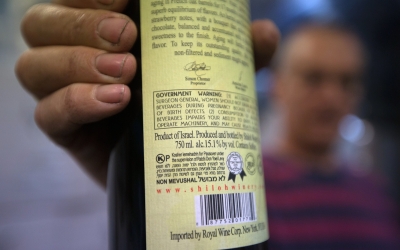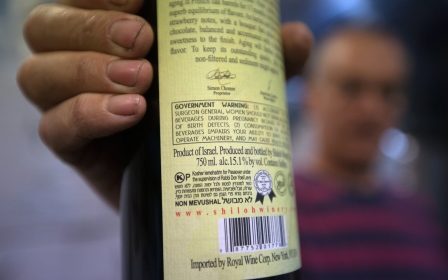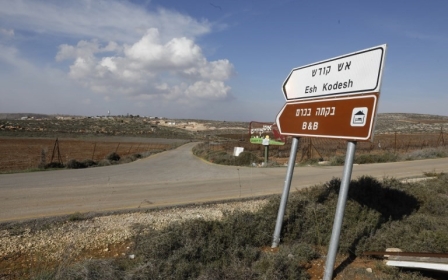Canadian MP, pro-Israel group call for appeal of ruling on Israeli settlement wine labels

A Canadian parliament member from Justin Trudeau's ruling Liberal Party said the government should appeal a recent court decision that Israeli settlement wines labelled "Product of Israel" are "inaccurate and misleading".
Anthony Housefather, an MP for the Mount Royal district in Montreal, tweeted late on Tuesday that he supported a call by the Centre for Israel and Jewish Affairs (CIJA), a pro-Israel lobby group, for the federal government to file an appeal in the case.
"I have read the decision and agree with @CIJAinfo that the decision should be appealed," said Housefather, who also chairs the House of Commons Standing Committee on Justice and Human Rights.
A day earlier, CIJA, a leading pro-Israel advocacy group in Canada, had called the Federal Court's ruling "misguided".
"Current labelling practices are fully consistent with the Canada-Israel Free Trade Agreement, as well as Canadian and international law," the group's CEO and president, Shimon Koffler Fogel, said in a statement.
New MEE newsletter: Jerusalem Dispatch
Sign up to get the latest insights and analysis on Israel-Palestine, alongside Turkey Unpacked and other MEE newsletters
"This is why we are urging the Government of Canada to appeal this misguided ruling," he said.
On 29 July, the Federal Court of Canada ruled that "Product of Israel" labels on wines manufactured in Israeli settlements in the occupied Palestinian territories were "false, misleading and deceptive".
"Canadian federal legislation requires that food products (including wines) that are sold in Canada bear truthful, non-deceptive and non-misleading country of origin labels," the court said.
The "Product of Israel" labels violate Canada's Consumer Packaging and Labelling Act and the Food and Drugs Act, it said.
Labelling settlement wines as "Products of Israel" is "unreasonable," the decision said.
A spokeswoman for Canada's Minister of Agriculture told MEE on Wednesday that the Canadian Food Inspection Agency (CFIA) is "currently reviewing the court's decision".
"We have no further comment for the moment," the spokeswoman said in a brief email.
Free-trade agreement
The case goes back to 2017, when Canadian-Jewish activist David Kattenburg filed a complaint challenging the fact that wines made and manufactured in Israeli settlements in the occupied West Bank were sold in Canada under the "Product of Israel" label.
The wines in question were made by Psagot Winery and Shiloh Winery, both of which are based in the occupied West Bank.
At first, the CFIA ordered liquor stores in the province of Ontario to remove the mislabelled wines from their shelves.
It said the wines could not be sold as "Product of Israel" because they were made "from grapes that are grown, fermented, processed, blended and finished in the West Bank occupied territory", Canadian media reported at the time.
'Canadian federal legislation requires that food products (including wines) that are sold in Canada bear truthful, non-deceptive and non-misleading country of origin labels'
- Federal Court of Canada
But the agency quickly reversed its position, saying the label could be used as per the Canada-Israel Free Trade Agreement (CIFTA), an accord that outlines tariff-free imports and exports between the two countries.
To justify its reversal, it cited a clause in CIFTA that states that Israeli territory is defined as "the territory where its [Israel's] customs laws are applied".
That argument was rejected by Kattenburg and his attorney, who said CIFTA does not apply to the case.
"Allowing settlement wines to be imported into Canada tariff free - extending tariff privileges to settlement wines - constitutes endorsement and acknowledgement and aid and support for Israel's settlement enterprise, which is illegal," Kattenburg told MEE earlier this year.
"Hypocritical is the most charitable term I can use to describe that."
Israel took control of the West Bank in the 1967 war. Palestinian rights groups consider Israeli settlements and military presence in the territory to be illegal. Late in 2016, the United Nations Security Council adopted a resolution denouncing the settlements as a "flagrant violation under international law".
In its 29 July decision, the Federal Court of Canada did not say how the settlement wines should be labelled in Canada going forward.
"That is a matter for the CFIA," the court said, calling on the agency's complaint office to "redetermine" its position.
Middle East Eye delivers independent and unrivalled coverage and analysis of the Middle East, North Africa and beyond. To learn more about republishing this content and the associated fees, please fill out this form. More about MEE can be found here.




